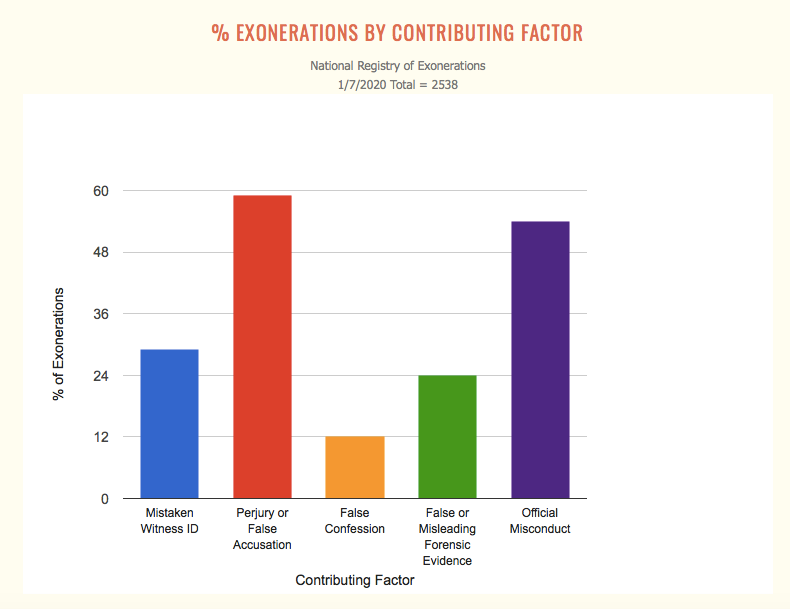The Truth Behind Wrongful Convictions
- huskyhowldfjh

- Jan 10, 2020
- 4 min read
Author | Victoria Hammill | Jan. 10 2020
What is a Wrongful Conviction?
One in twenty-five defendants sentenced to death are innocent. This may be the most alarming fact I have come across in my research on wrongful convictions.
A wrongful conviction means that a person was arrested, tried, and convicted of a crime that they did not commit. In order to transition from being convicted and incarcerated for a crime to being declared wrongfully convicted, your case must be reopened or re-examined by professionals and there must be proof of legal misconduct or new evidence presented. Wrongful Convictions are not a recent or new issue, but have only recently gained national attention as DNA testing has significantly improved causing more cases to be reopened. This has led to many organizations such as the Innocence Project, National Registry of Exonerees, and even prosecutors opening a Conviction Integrity Unit responsible for reopening old cases that may have new evidence or a form of misconduct. In 2018 Conviction Integrity Units across the United States collectively exonerated 344 people. That is almost 1 person every day was released from prison for a crime they did not commit, by only the help of the prosecutor's office. This number does not include anyone exonerated based on outside legal support, or re-trials. The National Registry of Exonerations has tallied more than 2,500 wrongful convictions since 1989 with the number going up every year. So far, this has cost defendants an accumulative 22,000 years incarcerated for crimes they did not commit.
Despite these growing initiatives to find victims of wrongful convictions, most states are still severely lacking a formal compensation guide to help these convicts get back on their feet after being released.
Seriousness of Wrongful Convictions (statistics)(spectrum of crimes):

The second most common contributing factor to wrongful convictions, featured in over 50% of cases is official misconduct. This is a very striking and alarming statistic, as this shows how easily the legal system can be manipulated. It has led to a change in official proceedings and some power being removed from the prosecution. This is also important because if official misconduct is a factor in more than half exonerations, then more than half exonerees should be receiving adequate compensation by the government who should be held responsible for their actions. Yet this is nowhere near the case.

Another important factor to showcase the severity of wrongful convictions is the disproportionate imprisonment of black convicts and the span of charges. In every category except Child Sex Abuse, a disproportionate amount of the exonerees are black. This further highlights the racism problem in the United States against black people in the legal system.
Wrongful Convictions are most commonly discussed in homicide cases when we read about them in the media because they receive the most media attention. But they are not the only cases where people have been wrongly sent away to prison. It can also be found in assault and robbery cases for serious crimes, and can be quite common in low-level drug crimes, with the Conviction Integrity Unit in Harris County, Texas alone exonerating 45 defendants in 2015 for low-level drug crimes. These detainees were encouraged to plead guilty to crimes which were never properly investigated and evidence samples never tested.
Why Compensation Matters?
Compensation is what an exoneree receives upon release from prison. This is often money, but can also be rewarded in other ways such as medical care, housing assistance, job support, education, therapy and anything else the government can do to help a wrongfully convicted exoneree rebuild a life outside of prison.
In many cases, the convict may have gone to prison when they were still a teenager and may have never finished high school, or university, so when they are released from prison they will not have adequate training to compete in an ever changing competitive job market. It can also take a while to have your record cleared, so exonerees may hold a criminal record even after they are released and many employers will not hire someone with a record.
Spending years in prison for a violent crime which you did not commit is extremely difficult on someone's psyche and can destroy an inmates mental health. This can lead many exonerees to reoffending or down dark paths if they do not have the knowledge or money to seek professional help in transitioning after possibly decades in prison.
Monetary compensation is also very important, as it can fund many of the other supports needed even if the government does not directly help in guidance. States hold shockingly different caps and restrictions for compensation. A man can go to prison for 38 years and receive a maximum total payment of $20,000 in New Hampshire, $25,000 in Wisconsin unless otherwise petitioned, $250,000 in Louisiana, $500,000 in Mississippi and Nebraska, $2,000,000 in California, or no limit in New York State. The inconsistency can be very unfair to exonerees who have already suffered greatly. It can also take years for compensation petitions to work themselves through the courts to see even a dime.
It is everyone’s nightmare to be arrested, tried and convicted of a crime they didn’t commit. Even if you beat the odds, and have your conviction overturned by a system with no incentive to revisit past conviction, you are then subjected to a further injustice, by not reviving any meaningful amount of compensation, monetary or otherwise. The saying goes, “if you can’t do the time, don’t do the crime” but how can we help those who did the time without doing the crime.
After reading this article, I just have a few short questions about your opinion on wrongful convictions:




Comments